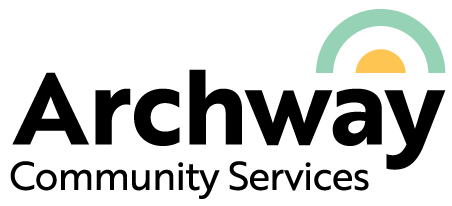
When the pandemic first began, Sam was laid off and her schooling went virtual. Living on her own became a whole lot lonelier than before. Without a routine and limited social interaction, Sam struggled more and more to even make it out of bed. Check-in calls and walks with her YRC youth worker helped to stay connected to people, have some sort of routine and figure out how to stay safe physically and mentally.
As youth navigate changing bodies, roles, and responsibilities, they are under more stress which can exacerbate existing mental health challenges. Archway staff who support youth have noticed that COVID has acted as an accelerator in an already difficult life period and waitlists for some mental health services for youth have gotten “incredibly long.”
One of the Archway programs serving youth and their caregivers is the Archway Youth Resource Centre (YRC). YRC provides a variety of services including outreach support, crisis intervention, school support, independent living programs and life skills classes.
Over COVID, YRC staff kept pivoting as they figured out how to best connect with youth and support them through new challenges.
“Youth were already spending too much time online before COVID, and now their screen time has gone even higher,” shared Wanda Phillips, a YRC Team Lead. “All these virtual meetings mean youth always have a mirror on themselves where they can judge themselves. And so for youth who are already struggling and trying to figure out their identities and where they belong and how to cope and regulate their own emotions it becomes very, very difficult.
“People can have a hard time being alone with themselves and will seek out other people, but that’s not always in their best interest. We’ve seen that more time online exposed some youth to grooming by predators,” said Simone Maassen, the Manager of Youth Services
How Parents Can Help
Simone shares that depression or anxiety may not always look as expected, “being really angry, unapproachable and rude can be just as much a sign of somebody being highly anxious and feeling depressed.”
“Some youth are able to cope in a school setting but once they are home may turn into a different person. It’s hard to understand, but this means they feel safe enough to let out their emotions.
Wanda shared “the best thing that a parent can do to support their teenager is to work on their own emotional intelligence. Then they can come alongside their youth and coregulate. It’s important to realize that a child’s behaviour is not about you which can help you from reacting negatively.”
“A lot of parents know they don’t want to parent like they have been parented, but they actually don’t know how to do it differently because they’ve never experienced it,” said Simone.
“So they’re doing absolutely the best they can, but they have their own challenges. If their kids have challenges, then the pressure’s all around and you can have a recipe for disaster.”
Programs for youth often work with the whole family and YRC provides parenting groups where caregivers can find support and information.”

Some of the YRC Team
“Youth are really, really resilient and given the right supports and resources, that they can make it through almost anything.”
The Importance of Relationships
A formal study of the impact of one YRC program confirmed the importance of the relationships that youth have with their support worker.
“My parents and my youth worker are my cheerleaders now.” – YRC Youth
“We know that the relationship is the key and the catalyst to anything else that happens. It may take a long time to see any sort of change, but we’re planting seeds every time we connect,” said Simone.
Youth workers regularly checked in on youth through texting, phone calls, and visits which gave youth a small sense of routine, as routines went out the door during the beginning of COVID.
Maintaining these connections was possible for existing clients but extremely difficult with new clients. As youth workers build relationships, they usually offer rides to youth or will buy them meals but were unable to do this during some periods of COVID guidelines.
“That was a huge barrier to service and a huge barrier to connection. But our youth workers did get very creative in finding ways to connect to youth,” said Wanda.
They showed up to their homes to meet outside, went on walks and met inside while physically distanced. Staff taught healthy relationship classes online, met one-to-one virtually and hosted social groups where they played games and gave youth a chance to socialize.
Substance Abuse
Some youth use substances to cope with mental health conditions and YRC staff saw an increase in use and overdoses over COVID. Restricted international borders have contributed to a toxic drug supply leading to the loss of several YRC clients and their family members.
As staff struggled to process the deaths themselves, they were supporting other clients who were friends with the client. “The amount of trauma that youth have gone through is absolutely mind-boggling, “said Wanda.
Knowing their work was quite literally about life and death, staff made safety plans with youth, gave out Naloxone kits and referrals to addiction services.
To help cope with overdoses and other crises, staff have regular opportunities to debrief and try to focus on the successes of clients moving forward in small steps.
“It’s been a struggle; we have to contextualize and remind ourselves that this is bigger than ourselves. We can’t save everyone but we’re going to try to be that difference for every youth we’re connected to,” said Wanda.
Wanda encourages her staff that “youth are really, really resilient and given the right supports and resources, that they can make it through almost anything.”
